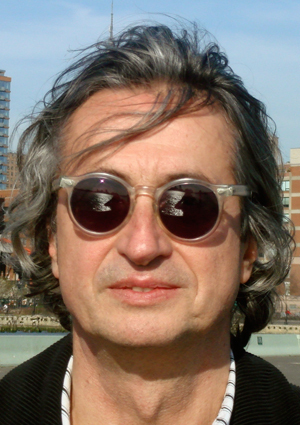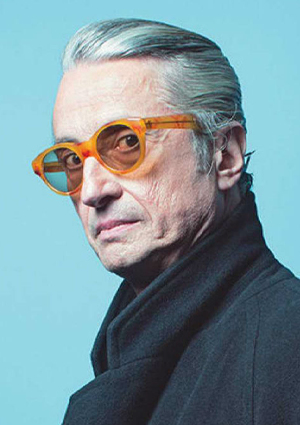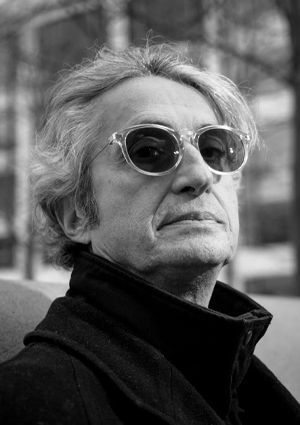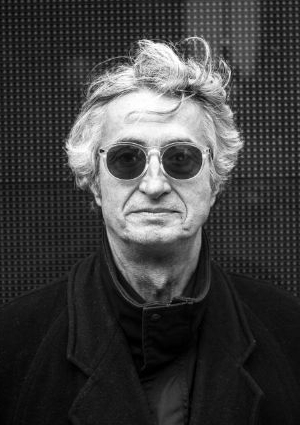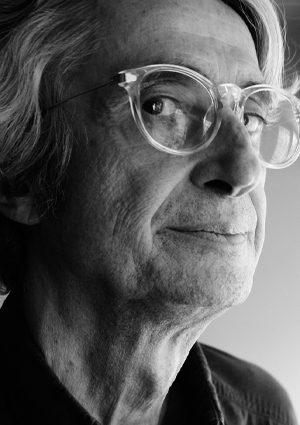Director, Screenplay, Producer, Director of photography, Edition, Investigation, Actor / Actress, Music, Sound, Executive Producer, Text - Argument
Luis Ospina
www.luisospina.com
Born in Cali on June 14, 1949, Luis Ospina passed away in Bogotá on September 27, 2019. He was a renowned screenwriter, producer, and film director who throughout his career directed at least 34 productions. He was co-director of the Cali Cinema Club (1972-77), professor of cinema at the Universidad del Valle (1979-80), director of the Cinemateca at the La Tertulia Museum of Modern Art in Cali (1986), film critic and writer for several specialized publications, some of which he co-founded, including Ojo al Cine, Kinetoscopio, El Pueblo, Cine, El Malpensante, Número, and Cinemateca. From 2009 until his death, he served as artistic director of the Cali International Film Festival (FICCALI).
“Although I like to think of myself as having a cinematic memory, I don't remember clearly what the first movie I saw was. Maybe because ever since I can remember, cinema was always present in my heart. And in my home. My father not only made home movies of our family life, but also projected rented Hollywood movies in our garage for my family and neighbors. The second great ally of my cinephilia was the help. Every Sunday, religiously, the maid on duty took me and my brothers to the movies. Thanks to this early cinematographic stimulation, at the age of 14 I shot my first short film Vía cerrada (1964) with my father's camera," Ospina said.
He studied film at the University of Southern California (1968-69) and the University of California, Los Angeles (1969-72). "As a filmmaker I am a product of the sixties and seventies. On the memorable dates of May '68, I graduated from high school and went to California to study film. As everyone knows, those were years of rebellion and revolution almost everywhere. During my four years of study I participated in the student movement and attended various Marxist and anarchist study groups. I also collaborated on several militant films that were made when the UCLA film school went on strike and took over the university equipment. We all thought we could change the world.”
On his return to Colombia in 1974, he abaned together with Andrés Caicedo, Carlos Mayolo, and Ramiro Arbeláez to start the magazine Ojo al Cine, the foundation of what is known as the Cali Group or Caliwood, the legendary group of artists that renewed Colombian cinema in the seventies. From then on, Luis Ospina was on a continuous production schedule that would lead him to direct the fiction feature films Pure Blood (Pura sangre, 1982) and Breath of Life (Soplo de vida, 1999); to make more than twenty short films such as Acto de fe (1970), Asuncion (1975), The Vampires of Poverty (Agarrando pueblo, co-directed with Carlos Mayolo, 1978), and In Search of Maria (En busca de María, co-directed with Jorge Nieto, 1985). He directed important documentary titles such as Andrés Caicedo: A Few Good Friends (Andrés Caicedo: unos pocos buenos amigos, 1986); Al pie, Al pelo, and A la carrera (1991); Nuestra película (1993); The Supreme Uneasiness: Incessant Portrait of Fernando Vallejo (La desazón suprema: Retrato de Fernando Vallejo, 2003); A Paper Tiger (Un tigre de papel, 2007) and From Illusion to Bewilderment (De la ilusión al desconcierto, 2007), a series on the history of Colombian cinema from 1970 to 1995. He also edited the feature films Carne de tu carne (1983) and La mansión de araucaima (1986) by Carlos Mayolo.
"I think my real calling has been documentary. Fiction cinema, with all its technical paraphernalia and high costs, has always been a state of exception for me, while documentaries are a state of grace. Thanks to video, I have been able to express myself in a more continuous way and with greater coherence, investigating through documentaries, over more than thirty works, three themes that have always obsessed me: the city, memory, and death, which were my starting point for making my first feature film documentary Andrés Caicedo: A Few Good Friends (1986).”
He co-produced the German feature film Jackpot (1976) by Renate Sami and Matthias Weiss, produced by ZDF. He was editor of the feature films Viene el hombre (collective creation, 1973), the short films La hamaca (1975) and Sin telón (1975) by Carlos Mayolo, Cartagena: Festival de cine (1976) by Luis Crump, La otra cara de La Moneda (1976) by Eduardo Carvajal, Atrapados (1987) by Juan José Vejarano, Valeria (1987), Las andazas de Juan Máximo Gris (1987) by Oscar Campo, and Momentos de un domingo (1987) by Patricia Restrepo.
His films have taken awards in the international festivals of Oberhausen, Cádiz, Toulouse, Bilbao, Sitges, Habana, Biarritz, Lima, Viña del Mar, Antofagasta, Caracas, Bogotá, and Cartagena. Retrospectives and showcases of his work have been held in Paris, Yamagata, Busán, Biarritz, New York, Los Angeles, Caracas, Santiago, Buenos Aires, Toulouse, Barcelona, Madrid, Lima, Rio de Janeiro, Cali, Medellín, Barranquilla, and Bogotá. His first comprehensive retrospective was at DocLisboa 2018 and during the fifty-sixth edition (2016) of the Cartagena Film Festival (FICCI) he became the first Colombian to receive a tribute from the festival.
Ospina directed the video documentary workshop Comuna's Películas at the Liceo Santo Domingo Savio in Medellín (1997). He co-edited with Sandro Romero Rey the books Destinitos Fatales (1984) and Ojo al cine (1999) by Andrés Caicedo. He co-authored the play Sólo mujeres solas, which premiered at the Teatro Nacional (2001). He was a professor at the Documentary Workshop offered by the Universidad Javeriana (2001-2004) and the Universidad de Los Andes (2003-2004).
He was recognized for his ouvre with the Manuel Murillo Toro Medal of Merit for Communications (1986), the Cultural Medal of Merit in Cinema at Cali International Festival of the Arts (2001), the Trophy of the second Cinmilímetros Cali Film and Video Festival for his valuable contribution to Colombian cinema (2001). In 2010, the Ministry of Culture gave him the prize Toda una vida dedicada al cine and the then In Vitro Visual International Festival (today called the Bogotá Short Film Festival or BOGOSHORTS) recognized his contribution to Colombian cinema with the Santa Lucía statuette.
In 2007 he published the book Palabras al viento: Mis sobras completas, a compilation of his film writings, the same year that the Universidad del Valle awarded him the Honorary Degree in Journalism and Social Communication. He is also the author of the booklets Andrés Caicedo: cartas de un cinéfilo (2007) and 2010 saw the publishing of a critical anthology of his work, Oiga/Vea: sonidos e imágenes de Luis Ospina. From 2009 until his death, he served as artistic director at the Cali International Film Festival (FICCALI). He was also curator of the exhibition Andrés Caicedo: morir y dejar obra (2012).
In 2019, with his film Mudos Testigos (in development), Luis Ospina was selected to participate in FIDLab, a platform supporting international co-production, at the Marseille International Film Festival in France. Mudos Testigos, his latest project, consists of a collage of diverse images of Colombian silent film, edited in such a way that it looks like a single imaginary film. That same year, he was also part of the cast of Laura Amelia Guzmán and Israel Cárdenas' film Holy Beasts (La fiera y la fiesta) along with Geraldine Chaplin and Udo Kier, a film that premiered in the Panorama section of the Berlinale.
September, 2019
Filming
Director
SILENT WITNESSES (2023)
Director
IT ALL STARTED AT THE END (2016)
Director
UN TIGRE DE PAPEL (2007)
Director
LA DESAZÓN SUPREMA: RETRATO INCESANTE DE FERNANDO VALLEJO (2003)
Director
SOPLO DE VIDA (1999)
Director
NUESTRA PELÍCULA (1993) (1993)
Director
Director
Director
EN BUSCA DE MARÍA (1985)
Director
PURA SANGRE (1982)
Director
AGARRANDO PUEBLO (1978)
Director
ASUNCION (1976)
Director
Screenplay
SILENT WITNESSES (2023)
Screenplay
IT ALL STARTED AT THE END (2016)
Screenplay
UN TIGRE DE PAPEL (2007)
Screenplay
LA DESAZÓN SUPREMA: RETRATO INCESANTE DE FERNANDO VALLEJO (2003)
Screenplay
NUESTRA PELÍCULA (1993) (1993)
Screenplay
Screenplay
EN BUSCA DE MARÍA (1985)
Screenplay
PURA SANGRE (1982)
Screenplay
AGARRANDO PUEBLO (1978)
Screenplay
ASUNCION (1976)
Screenplay
Producer
IT ALL STARTED AT THE END (2016)
Producer
UN TIGRE DE PAPEL (2007)
Producer
NUESTRA PELÍCULA (1993) (1993)
Producer
AGARRANDO PUEBLO (1978)
Director of photography
UN TIGRE DE PAPEL (2007)
Director of photography
LA DESAZÓN SUPREMA: RETRATO INCESANTE DE FERNANDO VALLEJO (2003)
Director of photography
NUESTRA PELÍCULA (1993) (1993)
Edition
IT ALL STARTED AT THE END (2016)
Edition
THE STOPLIGHT SOCIETY (2010)
Edition
UN TIGRE DE PAPEL (2007)
Edition
SOPLO DE VIDA (1999)
Edition
NUESTRA PELÍCULA (1993) (1993)
Edition
Edition
EN BUSCA DE MARÍA (1985)
Edition
PURA SANGRE (1982)
Edition
AGARRANDO PUEBLO (1978)
Edition
Investigation
SILENT WITNESSES (2023)
Investigation
UN TIGRE DE PAPEL (2007)
Actor / Actress
BALLAD FOR DEAD CHILDREN (2022)
Actor / Actress
LA VENGANZA DE JAIRO (2021)
Actor / Actress
Actor / Actress
IT ALL STARTED AT THE END (2016)
Actor / Actress
LA MANSIÓN DE ARAUCAIMA (1986)
Actor / Actress
CARNE DE TU CARNE (1983)
Music
Sound
UN TIGRE DE PAPEL (2007)
Sound
LA DESAZÓN SUPREMA: RETRATO INCESANTE DE FERNANDO VALLEJO (2003)
Sound
AGARRANDO PUEBLO (1978)
Text - Argument
PURA SANGRE (1982)

